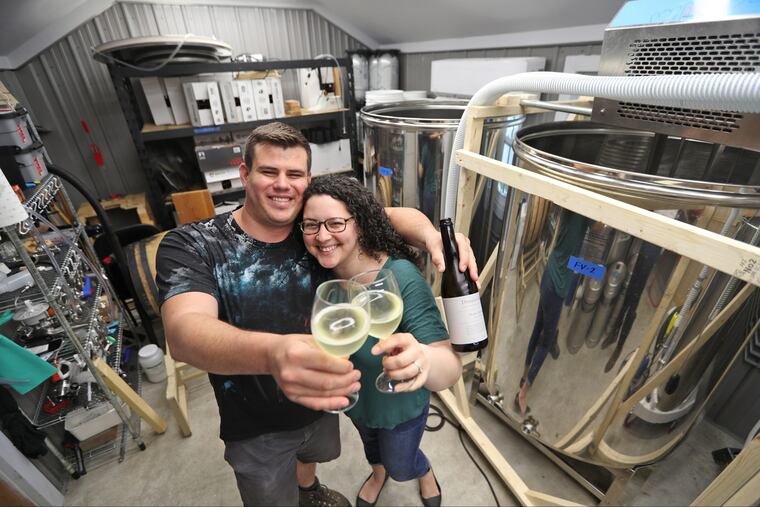Dressler Estate’s still cider adds an elegant option to bubbling local cider scene
Downingtown's Dressler Estate takes a more wine-like approach to distinguish its ciders, and it's all about the yeast and bubbles – of lack thereof.

Landed gentry they are not. At least not yet. The "estate" at Dressler Estate is more like a tricked-out hard cider garage in Downingtown. But mechanical engineer Brian Dressler, 31, has outfitted his little space with everything necessary — a trio of fermentation tanks on wheels, a recently rehabbed fruit grinder, a collapsible bottling machine — for him and wife and partner Olga Dressler to make some of the most intriguing new ciders in the region.
Local restaurants just held the first of what I hope becomes an annual Philly Cider Week festival. Because cider is one of the most dynamic sectors of the local craft beverage scene, both in the city and suburbs, where the fermentation of local fruit can give a sense of terroir — quite literally, the taste of the land — more directly than the still-burgeoning beer and spirit boom that cider's momentum is riding. In many cases, cider has been pitched as an artful gluten-free alternative to beer. But the Dresslers have taken a more winelike approach that distinguishes their products, and it's all about the yeast and bubbles.
The apples, too — yes, they're key. And for their flagship bottles, the Dresslers have turned to century-old Kauffman's Fruit Farm in Bird-in-Hand, Lancaster County, for a sweet-tart "modern" blend of relatively common table apples (Empire, Fuji, Gala, Golden Delicious, Jonagold, McIntosh and Pink Lady, among others) as opposed to increasingly popular heritage varieties grown specifically for cider.
It's fascinating to see how the same base juice diverges into completely different products depending upon the yeast. Dressler uses a Champagne yeast for its sparkling version, which takes on a pale, cloudy hue and a delicately dry fruit profile, with hints of exotic fruit that is reminiscent of a pét-nat wine energized by a bottle-conditioned fermentation of six weeks.
Dressler's still cider, however, may be its most distinctive product. White wine yeast is used on that same base juice, but the result is golden and crystal clear. And unlike so many treacly Pennsylvania apple wines that have an almost artificial sweetness, this one is completely dry. It does have a deceptively saucy richness on the nose, but that dries out completely dry when you take a sip. The cider's true elegance is evident on the long finish, which evokes the memory of a fall afternoon filling old crates with fresh-picked apples at an orchard. The more I drank, the stronger it became. I can't imagine a better alternative to wine for the Thanksgiving meal. I can imagine how good these ciders will become if, and when, the Dresslers ever acquire their own orchards to give their "garagiste" estate ciders some actual acres.
– Craig LaBan
Dressler Estate Modern ciders are available at multiple restaurants, including Helm Rittenhouse, Cinder, and Prohibition Taproom; farm markets, where Dressler sells direct for $16-18 a bottle; and at other retail locations. See the website for the complete list, though prices for the 750 ml bottles vary greatly, from just under $20 at the Beer Yard (218 Lancaster Ave., Wayne, 610-688-3431) to $24 for the still and $28 for the sparkling at multiple Di Bruno Bros. locations in Center City.